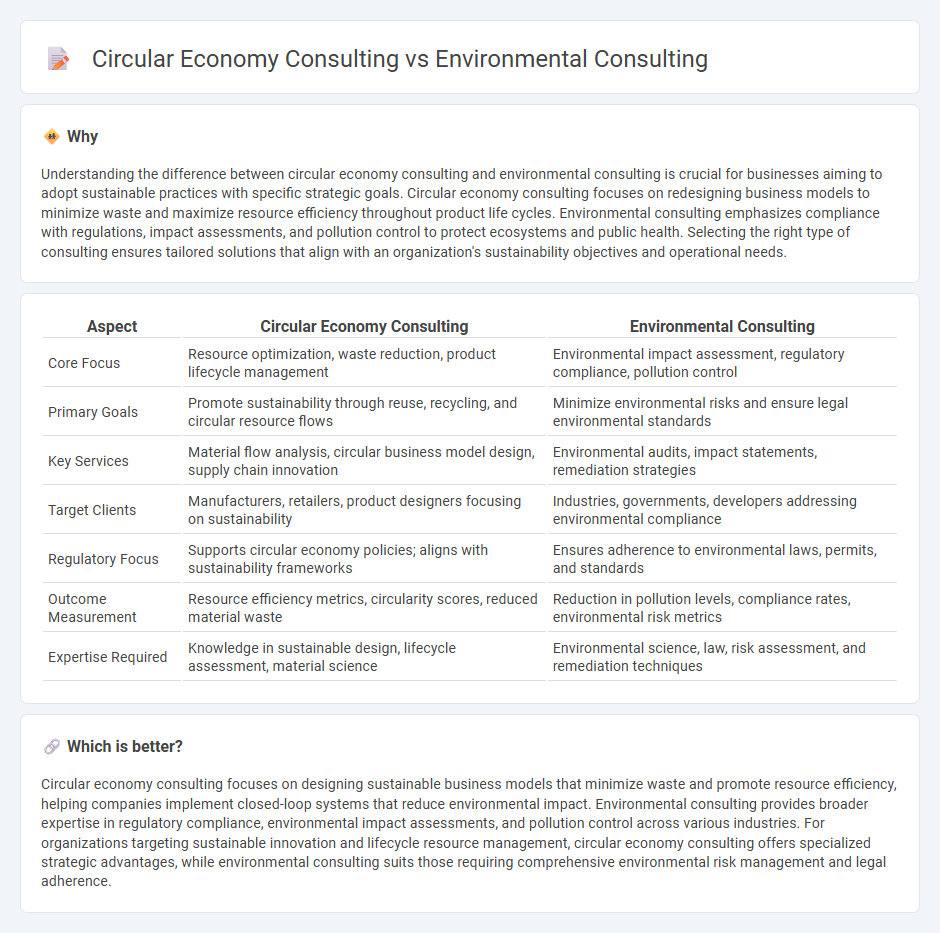
Circular economy consulting focuses on redesigning business processes to minimize waste and maximize resource efficiency by promoting reuse, recycling, and sustainable product lifecycle management. Environmental consulting addresses broader regulatory compliance, risk assessment, and environmental impact mitigation across various industries. Explore the key differences between circular economy and environmental consulting to optimize your sustainability strategy.
Why it is important
Understanding the difference between circular economy consulting and environmental consulting is crucial for businesses aiming to adopt sustainable practices with specific strategic goals. Circular economy consulting focuses on redesigning business models to minimize waste and maximize resource efficiency throughout product life cycles. Environmental consulting emphasizes compliance with regulations, impact assessments, and pollution control to protect ecosystems and public health. Selecting the right type of consulting ensures tailored solutions that align with an organization's sustainability objectives and operational needs.
Comparison Table
| Aspect | Circular Economy Consulting | Environmental Consulting |
|---|---|---|
| Core Focus | Resource optimization, waste reduction, product lifecycle management | Environmental impact assessment, regulatory compliance, pollution control |
| Primary Goals | Promote sustainability through reuse, recycling, and circular resource flows | Minimize environmental risks and ensure legal environmental standards |
| Key Services | Material flow analysis, circular business model design, supply chain innovation | Environmental audits, impact statements, remediation strategies |
| Target Clients | Manufacturers, retailers, product designers focusing on sustainability | Industries, governments, developers addressing environmental compliance |
| Regulatory Focus | Supports circular economy policies; aligns with sustainability frameworks | Ensures adherence to environmental laws, permits, and standards |
| Outcome Measurement | Resource efficiency metrics, circularity scores, reduced material waste | Reduction in pollution levels, compliance rates, environmental risk metrics |
| Expertise Required | Knowledge in sustainable design, lifecycle assessment, material science | Environmental science, law, risk assessment, and remediation techniques |
Which is better?
Circular economy consulting focuses on designing sustainable business models that minimize waste and promote resource efficiency, helping companies implement closed-loop systems that reduce environmental impact. Environmental consulting provides broader expertise in regulatory compliance, environmental impact assessments, and pollution control across various industries. For organizations targeting sustainable innovation and lifecycle resource management, circular economy consulting offers specialized strategic advantages, while environmental consulting suits those requiring comprehensive environmental risk management and legal adherence.
Connection
Circular economy consulting and environmental consulting intersect through their shared focus on sustainability and resource efficiency. Circular economy consulting emphasizes redesigning production and consumption systems to minimize waste and maximize reuse, directly supporting environmental consulting goals of reducing ecological impact and promoting sustainable practices. Both disciplines collaborate to develop strategies that align corporate operations with environmental regulations and sustainable development targets.
Key Terms
Sustainability Assessment
Environmental consulting specializes in evaluating the impact of projects on natural ecosystems, emphasizing compliance with environmental regulations and minimizing ecological footprints. Circular economy consulting prioritizes designing sustainable systems that reduce waste and promote resource efficiency through reuse, recycling, and closed-loop processes. Explore the distinctions and benefits of these consulting approaches to enhance your sustainability assessment strategies.
Waste Management Strategies
Environmental consulting specializes in assessing and mitigating the impact of waste through regulatory compliance, pollution control, and sustainable resource management. Circular economy consulting emphasizes designing waste management strategies that prioritize reuse, recycling, and closed-loop systems to minimize waste generation and promote material recovery. Explore in-depth approaches and benefits of each consulting type to optimize waste management strategies tailored to your business goals.
Resource Efficiency
Environmental consulting focuses on identifying and reducing environmental impacts through strategies like pollution control, waste management, and sustainable resource use, emphasizing overall ecosystem health. Circular economy consulting centers on designing systems that minimize waste by promoting resource reuse, recycling, and closed-loop processes to enhance material efficiency and business sustainability. Explore how leveraging specialized consulting can boost resource efficiency and drive your organization's environmental goals forward.
Source and External Links
Top 10 US Environmental Consulting Firms - Environmental consulting firms help companies navigate environmental responsibilities, ensuring compliance, risk mitigation, and sustainability across industries like energy, chemicals, and construction.
Environmental Consulting Jobs: Salary and Career Paths | Indeed.com - Environmental consultants manage environmental issues by helping industries reduce emissions, improve waste management, and comply with regulations through research, data analysis, and advisory roles.
Environmental consulting - Wikipedia - Environmental consulting covers compliance, site assessments, energy feasibility, environmental management systems, impact assessments, carbon management, and other specialized environmental services.
 dowidth.com
dowidth.com